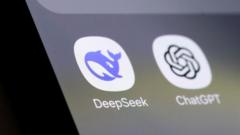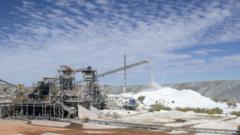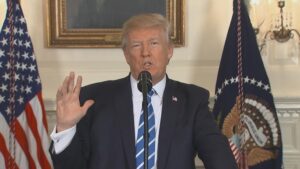The emergence of DeepSeek, a cost-effective Chinese AI chatbot, has disrupted the technology sector and challenged America's perceived dominance in artificial intelligence, leading to major stock sell-offs and skepticism among investors and industry analysts.
China's DeepSeek AI Revolutionizes Tech Landscape, Challenges US Dominance

China's DeepSeek AI Revolutionizes Tech Landscape, Challenges US Dominance
The launch of China's DeepSeek AI chatbot has sent shockwaves through the tech industry, resulting in significant stock market declines and questioning the future of American innovation.
The rapid rise of China's new AI application, DeepSeek, has caught the technology industry and financial markets off guard, significantly impacting perceptions of American leadership in artificial intelligence (AI). Venture capitalist Marc Andreessen referred to the AI chatbot's debut as "AI's Sputnik moment," reflecting a growing concern in the tech community about the consequences of this new competitor.
Over the past weekend, DeepSeek surged to become the most downloaded free app on Apple's US App Store. By the following Monday, the tech market experienced a significant sell-off fueled by fears regarding America's supremacy in the AI field. Notably, shares of AI chip maker Nvidia plummeted by 17%, leading to a staggering loss of nearly $600 billion in market value—the largest drop in the history of the US stock market.
A major factor behind this turmoil is the astonishingly low development cost of DeepSeek. While leading AI companies like OpenAI reported losses of $5 billion last year, the creators of DeepSeek claim they built their model for a mere $5.6 million. This stark contrast has led to intense curiosity and skepticism in Silicon Valley regarding the app's capabilities and funding sources.
Industry analysts, including veteran voice Gene Munster, expressed doubts about DeepSeek's financial claims, contemplating whether the company is operating with hidden subsidies or accurate numbers. Despite skepticism, analysts acknowledged the chatbot's surprising performance, indicating profound implications for American tech companies.
DeepSeek's launch stands as a challenge to the recent optimism expressed by US tech leaders, including OpenAI's Sam Altman and Oracle’s Larry Ellison, who had just shared a press conference with former President Donald Trump announcing a $500 billion investment plan for AI infrastructure. Trump has since labeled DeepSeek's entry as a "wake-up call" for America’s technology sector, emphasizing the potential benefits of developing cheaper AI systems.
In the wake of DeepSeek's momentum, even the energy sector has faced stock declines, as assumptions about the resources needed for AI development are re-evaluated. This instance raises questions about the necessity of significant capital investment for AI advancements.
DeepSeek's creators attribute their technology to existing resources and open-source software, suggesting a new paradigm for AI development. Reports indicate that DeepSeek's founder, Liang Wenfung, has strategically stockpiled GPUs (graphics processing units) crucial for AI applications, which adds another layer of intrigue to the startup's capabilities amidst US regulations on chip exports to China.
Although Alton provided a muted response to DeepSeek's impact on X, he acknowledged its impressive performance relative to price and noted the invigorating nature of competition it brings to the industry. As the technology landscape adapts to the emergence of DeepSeek, the narrative of American domination in AI is poised for a substantial reevaluation, likening the moment to the dawn of the space age after Sputnik's launch.


















